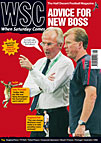 Having beaten England, Portugal found themselves within a game of the World Cup final. Phil Town captures the mood in Portugal
Having beaten England, Portugal found themselves within a game of the World Cup final. Phil Town captures the mood in Portugal
Speaking some time back at a conference on motivation, Luiz Felipe Scolari told the story of his first days with the Selecção in 2002. He got the players together and asked them to imagine the team as a truck and to consider what part of the truck each of them thought they represented. He found that what he had inherited from António Oliveira was a truck with four drivers and a wheel missing. Six months later, the same experiment came up with just two drivers and all the wheels in place.
This has been Scolari’s great gift to Portugal: to take the rabble that crashed out of the 2002 World Cup and, with some strategic cuts, mould them into a solid, coherent group. In fact “group” has been the watchword for this team; it’s the term most heard in interviews and press conferences, to the eerie point of making the players sound like brainwashed members of some weird cult. The philosophy is exploited to the maximum by Sargentão Scolari, who defends his players to the hilt and requires absolute allegiance in return, along with a sense of humility and a spirit of sacrifice. Cristiano Ronaldo is a case in point, producing during the World Cup increasingly mature displays, notwithstanding the arguable rights or wrongs of his part in the Rooney incident.
Scolari’s faith in players whose inclusion in the team was questioned paid dividends. Ricardo had a dodgy season at Sporting, Costinha went six months without playing after a dispute with Moscow Dynamo, Maniche’s season was disrupted and uneven, and a flagging Figo was struggling in the autumn of his career. All were first choices and had very good World Cups. Other decisions by the Brazilian that were criticised at the time also took on, in retrospect, the quality of astute foresight: Porto’s Ricardo Quaresma, SuperLiga player of the season, was left at home and proceeded to have a stinker of at the European Under‑21 Championship, held in Portugal at the end of May. And choosing to have the pre-Germany training camp in of all places Evora, notoriously the hottest spot in Portugal and sweltering in a heat wave at the time, proved excellent preparation for the high temperatures in Germany.
While nationalistic euphoria was less intense than two years ago at Portugal’s Euro 2004, when Scolari proclaimed that he wanted national flags hanging from every window, the povo’s relationship with the team was a more mature one this time and light years away from four years ago, the country then arrogantly expecting from the outset to see the cup paraded along the Avenida da Liberdade. Falling in line with Scolari’s discretion (“We’re in the top eight of the FIFA rankings, so we should come in the top eight in Germany. Anything more will be a bonus”), players and fans took each game as it came, and the latter at least seemed genuinely chuffed at finishing not in the top eight but in the top four, despite the Selecção failing to equal the third place won by Eusébio’s Magriços in 1966.
Another of Scolari’s skills has been to foster a sense of inclusiveness. To hear a senhora in her sixties discussing team tactics with a shop assistant was to know that Scolari had made A Equipa de Todos Nós just that: the team of all Portuguese, regardless of age, sex, race, class. Hundreds of all shapes, sizes and colours were at the airport to greet the team on their return and hundreds more lined the roads to the National Stadium, where in May 18,788 women had formed “The Most Beautiful Flag in the World” and put it in The Guinness Book of Records. This time, thousands sat for hours in the blazing sunshine to show their appreciation for a group that had done them proud. “The three symbols of the nation: the anthem, the flag and the Selecção,” ran one hastily felt-tipped banner. The farewell to the players, Figo and Pauleta for the last time, included a rousing rendition of “Campeões, Campeões, nós somos Campeões!”
As the players trooped away (not before doing a conga on the pitch to Uma Casa Portuguesa), a few questions were left in the air. One, which had been determinedly deflected throughout the tournament, was whether Scolari (“Fica, fica, fica!” they chanted at the National Stadium – “Stay, stay, stay!”) would remain in charge or not. Another was what awaits national hero Cristiano Ronaldo on his return to club football. It seemed that the poisonous message of the English tabloids had spread abroad, the player being booed relentlessly in the games against France and Germany. But the bitterness of some people’s sour grapes could not spoil the sweetness of a small country’s modest moment of pride.
From WSC 234 August 2006. What was happening this month